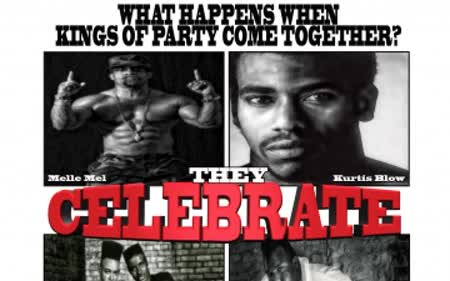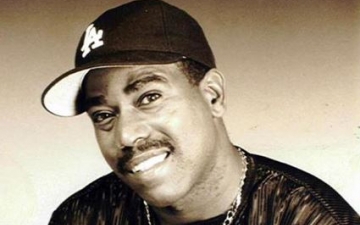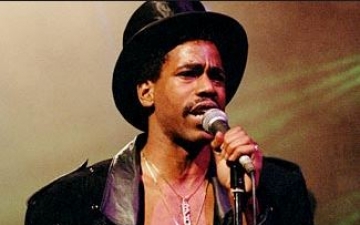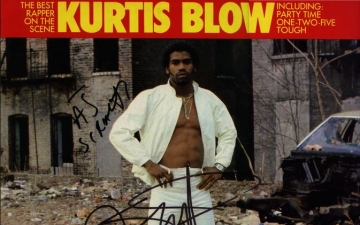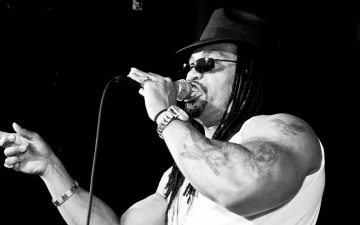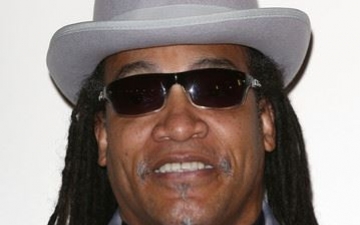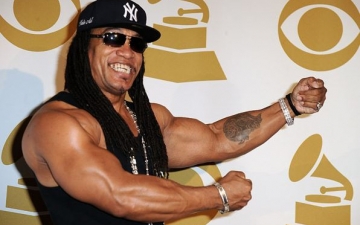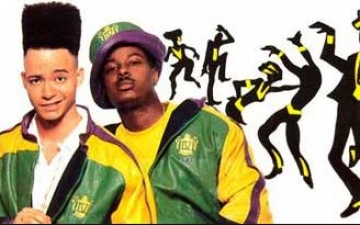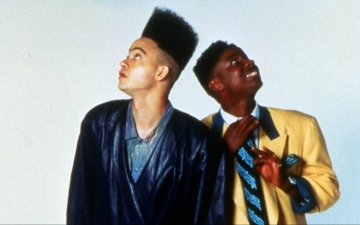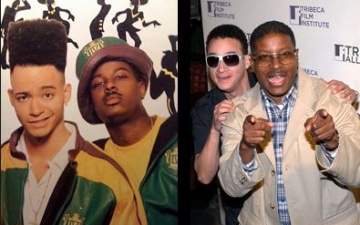Details:
Kurt Walker (born August 9, 1959),[1] professionally known by his stage name Kurtis Blow, is an American rapper and record producer.[2] He is the first commercially successful rapper and the first to sign with a major record label. "The Breaks", a single from his 1980 debut album, is the first certified gold record rap song. Throughout his career he has released 15 albums and is currently an ordained minister.In 1979, aged twenty, Kurtis Blow became the first rapper to be signed by a major label, Mercury, which released "Christmas Rappin'".[3] It sold over 400,000 copies. Its follow-up, "The Breaks", sold over half a million copies.[2] He was also the first rapper to perform overseas.[4] He released ten albums over the next eleven years. His first album was Kurtis Blow, while his second was the Top 50 pop album Deuce. Party Time featured a fusion of rap and go-go. Ego Trip included the hits: "8 Million Stories," "AJ Scratch," and "Basketball". His 1985 album, America, garnered praise for its title track's music video. From this album, the song "If I Ruled the World" became a Top 5hit on Billboard's R&B chart. Towards the end of the 1980s, he recording career waned and he moved into production.[3]Besides his own work, Kurtis has been responsible for hits by The Fat Boys and Run DMC.[2] Run began his career billed as 'The Son of Kurtis Blow'. Lovebug Starski, Dr. Jekyll and Mr. Hyde, Full Force, Russell Simmons and Wyclef Jean all have been produced by, or collaborated with, Walker. Former label mates René & Angela had their R&B chart topping debut "Save Your Love (For #1)" was produced by him. Along with Dexter Scott King, Walker co-ordinated "King Holiday," a song to celebrate Martin Luther King’s birthday, released in January 1986.
Melvin Glover (born May 15, 1961), known as Melle Mel (/ˈmɛli ˈmɛl/ and Grandmaster Melle Mel, is an American hip-hop musician – one of the pioneers of rapas lead rapper and main songwriter for Grandmaster Flash and the Furious Five.Melvin Glover, of a Cherokee mother, was the first rapper to call himself "MC" (Master of Ceremonies). Other Furious Five members included his brother The Kidd Creole (Nathaniel Glover), Scorpio (Eddie Morris), Rahiem (Guy Todd Williams) & Cowboy (Keith Wiggins). While a member of the group, Cowboy created the term "hip-hop" while teasing a friend who had just joined the US Army, by scat singing the words "hip/hop/hip/hop" in a way that mimicked the rhythmic cadence of marching soldiers.[1]Grandmaster Flash & The Furious Five began recording for Enjoy Records and released "Superrappin'" in 1979. They later moved on to Sugarhill Records and were popular on the R&B charts with party songs, like "Freedom" and "The Birthday Party". They released numerous singles, gaining a gold disc for "Freedom," and also toured. In 1982 Melle Mel began to turn to more socially aware subject matter, in particular the Reagan administration's economic (Reaganomics) anddrug policies, and their effect on the black community. A song entitled "The Message" became an instant classic and one of the first glimmers of conscious hip-hop. Mel recorded a rap over session musician Duke Bootee's instrumental track "The Jungle". Some of Mel's lyrics on "The Message" were taken directly from "Superrappin'". Other than Melle Mel, no members of the Grandmaster Flash & The Furious Five actually appear on the record. Bootee also contributed vocals (Rahiem was to later lip-sync Bootee's parts in the music video). "The Message" went platinum in less than a month and was the first hip-hop record ever to be added to the United States National Archive of Historic Recordings and the first Hip Hop record inducted into the Grammy Hall of Fame. Mel would also go on to write songs about struggling life in New York City ("New York, New York"), and making it through life in general ("Survival (The Message 2)"). Grandmaster Flash split from the group after contract disputes between Melle Mel and their promoter Sylvia Robinson in regard to royalties for "The Message". When Flash filed a lawsuit against Sugar Hill Records, their label, the factions of The Furious Five parted.
Kid 'n Play is an American hip-hop act from New York City that was popular in the late 1980s and early 1990s. The duo was composed of Christopher "Kid" Reid (April 5, 1964) and Christopher "Play" Martin (July 10, 1962) working alongside their DJ, Mark "DJ Wiz" Eastmond. Besides their successful musical careers, they are also notable for branching out into acting.Kid 'n Play recorded three albums together between 1988 and 1991: 2 Hype (1988), Kid 'n Play's Funhouse (1990), and Face the Nation (1991). Hurby "Luv Bug" Azor, the producer for Salt-n-Pepa (who had been a member of the The Super Lovers with Play) served as Kid 'n Play's manager and producer during the early portion of their career. All three albums focused upon positive lyrics backed by pop-friendly instrumental tracks. Among the group's most successful singles were 1989's "Rollin' with Kid 'n Play" (#11 on the Billboard R&B singles chart), 1990s "Funhouse" (#1 on the Billboard rap singles chart), and "Ain't Gonna Hurt Nobody" (another #1 rap hit). The group's stage show highlighted their teen-friendly personalities, and dances such as their trademark, the Kick Step. Kid's visual trademark was his hi-top fade haircut, which stood ten inches high at its peak. Martin regularly wore eight-ball jackets.Kid 'n Play were also notable for their dance known as the Funky Charleston, first seen in their video "Gittin Funky". Also affectionately known as the Kid and Play Kickstep, it was influenced by the 1920s era dance the Charleston. The Funky Charleston featured the New Jack Swing-aerobic dance moves typical of late 1980s urban street dancing. Unlike the original Charleston, The Funky Charleston requires two participants instead of one. This dance also was made quite popular in Kid 'n Play's feature film House Party, in which Kid and Play have a dance competition with Tisha Campbell and A.J. Johnson.
Melvin Glover (born May 15, 1961), known as Melle Mel (/ˈmɛli ˈmɛl/ and Grandmaster Melle Mel, is an American hip-hop musician – one of the pioneers of rapas lead rapper and main songwriter for Grandmaster Flash and the Furious Five.Melvin Glover, of a Cherokee mother, was the first rapper to call himself "MC" (Master of Ceremonies). Other Furious Five members included his brother The Kidd Creole (Nathaniel Glover), Scorpio (Eddie Morris), Rahiem (Guy Todd Williams) & Cowboy (Keith Wiggins). While a member of the group, Cowboy created the term "hip-hop" while teasing a friend who had just joined the US Army, by scat singing the words "hip/hop/hip/hop" in a way that mimicked the rhythmic cadence of marching soldiers.[1]Grandmaster Flash & The Furious Five began recording for Enjoy Records and released "Superrappin'" in 1979. They later moved on to Sugarhill Records and were popular on the R&B charts with party songs, like "Freedom" and "The Birthday Party". They released numerous singles, gaining a gold disc for "Freedom," and also toured. In 1982 Melle Mel began to turn to more socially aware subject matter, in particular the Reagan administration's economic (Reaganomics) anddrug policies, and their effect on the black community. A song entitled "The Message" became an instant classic and one of the first glimmers of conscious hip-hop. Mel recorded a rap over session musician Duke Bootee's instrumental track "The Jungle". Some of Mel's lyrics on "The Message" were taken directly from "Superrappin'". Other than Melle Mel, no members of the Grandmaster Flash & The Furious Five actually appear on the record. Bootee also contributed vocals (Rahiem was to later lip-sync Bootee's parts in the music video). "The Message" went platinum in less than a month and was the first hip-hop record ever to be added to the United States National Archive of Historic Recordings and the first Hip Hop record inducted into the Grammy Hall of Fame. Mel would also go on to write songs about struggling life in New York City ("New York, New York"), and making it through life in general ("Survival (The Message 2)"). Grandmaster Flash split from the group after contract disputes between Melle Mel and their promoter Sylvia Robinson in regard to royalties for "The Message". When Flash filed a lawsuit against Sugar Hill Records, their label, the factions of The Furious Five parted.
Kid 'n Play is an American hip-hop act from New York City that was popular in the late 1980s and early 1990s. The duo was composed of Christopher "Kid" Reid (April 5, 1964) and Christopher "Play" Martin (July 10, 1962) working alongside their DJ, Mark "DJ Wiz" Eastmond. Besides their successful musical careers, they are also notable for branching out into acting.Kid 'n Play recorded three albums together between 1988 and 1991: 2 Hype (1988), Kid 'n Play's Funhouse (1990), and Face the Nation (1991). Hurby "Luv Bug" Azor, the producer for Salt-n-Pepa (who had been a member of the The Super Lovers with Play) served as Kid 'n Play's manager and producer during the early portion of their career. All three albums focused upon positive lyrics backed by pop-friendly instrumental tracks. Among the group's most successful singles were 1989's "Rollin' with Kid 'n Play" (#11 on the Billboard R&B singles chart), 1990s "Funhouse" (#1 on the Billboard rap singles chart), and "Ain't Gonna Hurt Nobody" (another #1 rap hit). The group's stage show highlighted their teen-friendly personalities, and dances such as their trademark, the Kick Step. Kid's visual trademark was his hi-top fade haircut, which stood ten inches high at its peak. Martin regularly wore eight-ball jackets.Kid 'n Play were also notable for their dance known as the Funky Charleston, first seen in their video "Gittin Funky". Also affectionately known as the Kid and Play Kickstep, it was influenced by the 1920s era dance the Charleston. The Funky Charleston featured the New Jack Swing-aerobic dance moves typical of late 1980s urban street dancing. Unlike the original Charleston, The Funky Charleston requires two participants instead of one. This dance also was made quite popular in Kid 'n Play's feature film House Party, in which Kid and Play have a dance competition with Tisha Campbell and A.J. Johnson.
